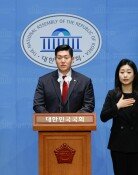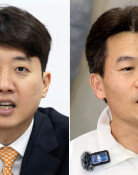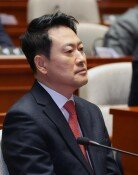[Editorial] A Government that Goes Against 80 Percent of Koreans Wont Do
[Editorial] A Government that Goes Against 80 Percent of Koreans Wont Do
Posted December. 07, 2005 08:32,
A national survey conducted by the National Assembly House Steering Committee and chaired by Uri Party lawmaker Chung Sye-kyun between late October and early November only reaffirmed how far away President Roh Moo-hyuns regime is headed from what the people want.
Since July, President Roh has clung to the idea of changing the political landscape with a coalition government for over four months. For its part, Cheong Wa Dae claimed, The biggest task of President Rohs last half presidential term is to resolve political regionalism and rearrange electoral districts. When criticism became louder, Roh countered that Focus on economy claims were political instigations, and Presidential Secretary for Public Affairs Cho Ki-sook quibbled, If 70 percent of the Korean people say that a crane is black, does it make the crane black?
However, according to a National Assembly survey, 84.6 percent of respondents answered that economic development was more important. If the government thinks that managing the country in a way that opposes 80 percent of the people will work, that itself is the regimes arrogance.
For three years with the Roh Administration, economic low growth persists, and investment and consumption in the private sector are still lagging. However, the government acts as if it is going to control the entire Republic of Korea Corporation, and focuses only on squeezing taxes and using them in national projects that it likes. In this poll, 82.7 percent of the respondents answered that the governments use of taxes was inefficient. That is why there are even signs of collective tax-paying resistance.
That is not all. On the issue of national security law, 57.6 percent answered to keep it the way it is, and 33.3 percent agreed to changing it in a way so it wont be abused. Only 9.1 percent supported complete abolishment. While the peoples opinion was like this, President Roh was saying, Lets send the national security law to a museum, and only inflated disputes between the ruling and opposition party that exhausted the people.
On the issue of aiding North Korea, over 60 percent answered that it should be diminished or completely halted. It proves once again that the majority of the people have turned their back on large-scale aid to North Korea without their consent.
With various aspects of government management going this way, it is not unreasonable that over 80 percent of the people think that what the government is doing is not right. Will the Roh Administration still say, If 70 percent of the Korean people say that a crane is black, does it make the crane black? If so, it is not a government that will co-exist with its people.







